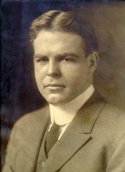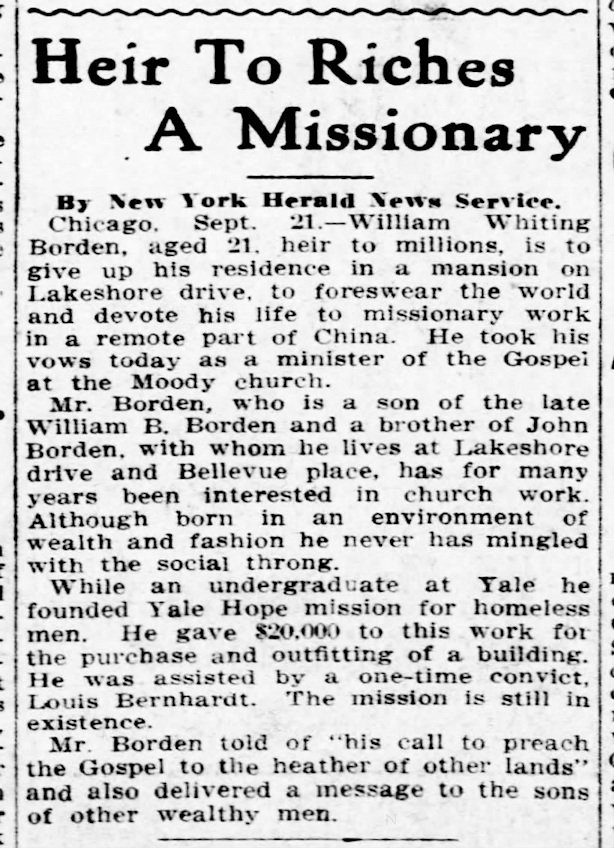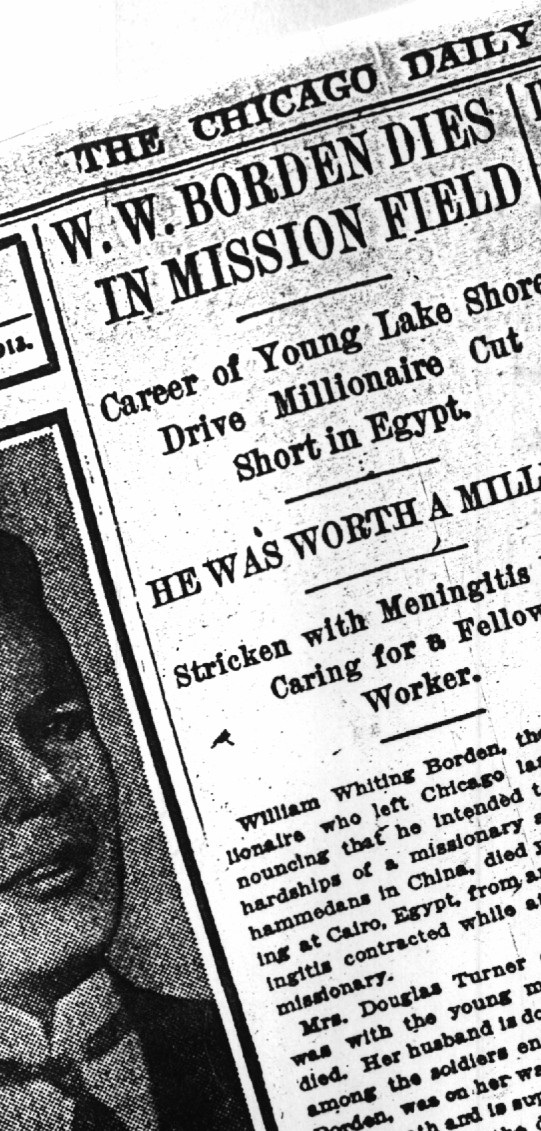
TL;DR:
William Whiting “Bill” Borden (1887–1913), heir to a vast fortune, surrendered his life to Christ as a teenager after a world trip exposed him to global need. At Yale, he became a spiritual leader, starting prayer groups that grew to include most of the student body. He ministered to the poor through the Yale Hope Mission and challenged his peers to consider foreign missionary service. He went to seminary to pursue a goal of serving among the Muslim Kansu people in China. En route to China, he stopped in Egypt to study Arabic. He died there of meningitis.
"Do not put out the Spirit's fire." -- 1 Thessalonians 5:19
Quotations are from Borden of Yale 09, by Mary Geraldine Guinness Taylor (Philadelphia: China Inland Mission, 1927)
In 1904, William "Bill" Borden graduated from a Chicago high school. He was already wealthy as an heir to his family's fortune from silver mining and real estate businesses. For his high school graduation present, William Borden's parents gave their 16-year-old son a trip around the world. As the young man traveled through Asia, the Middle East, and Europe, he felt a growing burden for the world's hurting people. Finally, Bill Borden wrote home about his "desire to be a missionary."1. Indeed, he has sometimes been referred to as the "millionaire missionary."
One friend expressed disbelief that Bill was "throwing himself away as a missionary."
Mrs. Howard Taylor wrote a biography of Borden a dozen years after his death. She said that William Borden's life could be summed up in three phrases: "No reserve. No retreat. No regrets." That first one certainly could be applied to Borden's decision to become a foreign missionary.

Even though young Borden was wealthy, he arrived on the campus of Yale University in 1905, trying to look like just one more freshman. Very quickly, however, Borden's classmates noticed something unusual about him, and it wasn't that he had lots of money. One of them wrote:
"He came to college far ahead, spiritually, of any of us. He had already given his heart in full surrender to Christ and had really done it. We who were his classmates learned to lean on him and find in him a strength that was solid as a rock, just because of this settled purpose and consecration."2
During his college years, Bill Borden made an entry in his personal journal that defined what his classmates were seeing in him. That entry said simply: "Say 'no' to self and 'yes' to Jesus every time."3
Borden's first disappointment at Yale came when the university president spoke in a convocation about the students' need to have "a fixed purpose." After that speech, Borden wrote: "He neglected to say what our purpose should be, and where we should get the ability to persevere and the strength to resist temptations."4 Surveying the Yale faculty and much of the student body, Borden lamented what he saw as the result of an empty, humanistic philosophy: moral weakness and sin-ruined lives.
During his first semester at Yale, Borden started something that would transform campus life. One of his friends described how it began:
"It was well on in the first term when Bill and I began to pray together in the morning before breakfast. I cannot say positively whose suggestion it was, but I feel sure it must have originated with Bill. We had been meeting only a short time when a third student joined us and, soon after, a fourth. The time was spent in prayer after a brief reading of Scripture. Bill's handling of Scripture was helpful. . . . He would read to us from the Bible, show us something that God had promised, and then proceed to claim the promise with assurance."5
Borden's small morning prayer group led to a movement that soon spread across the campus. By the end of his first year, 150 freshmen were meeting weekly for Bible study and prayer. By the time Bill Borden was a senior, one thousand of Yale's 1,300 students met in such groups.
Borden made it his habit to seek out the most "incorrigible" students and try to bring them to salvation.
"In his sophomore year, we organized Bible study groups and divided up the class of 300 or more, each man interested in taking a certain number so that all might, if possible, be reached. The names were gone over one by one, and the question asked, 'Who will take this person?' When it came to someone thought to be a hard proposition, there would be an ominous pause. Nobody wanted the responsibility. Then Bill's voice would be heard, 'Put him down to me.'"6
Borden's outreach ministry was not confined to the Yale campus. He cared about widows, orphans, and the disabled. He rescued drunks from the streets of New Haven. To try to rehabilitate them, he founded the Yale Hope Mission. One of Bill Borden's friends wrote that he "might often be found in the lower parts of the city at night, on the street, in a cheap lodging house or some restaurant to which he had taken a poor hungry fellow to feed him, seeking to lead men to Christ."7
Borden's missionary call narrowed to the Muslim Kansu people in China. Fixing his eyes on that goal, Borden never wavered. He also challenged his classmates to consider foreign missionary service. One of them said of him: "He certainly was one of the strongest characters I have ever known, and he put backbone into the rest of us at college. There was real iron in him, and I always felt he was of the stuff martyrs were made of, and heroic missionaries of more modern times."8
Although he was a millionaire, Bill seemed to "realize always that he must be about his Father's business, and not wasting time in the pursuit of amusement."9 Although Borden refused to join a fraternity, "he did more with his classmates in his senior year than ever before." He presided over the huge student missionary conference held at Yale and served as president of the honor society Phi Beta Kappa.
Upon graduation from Yale, Borden turned down some high-paying job offers. Of this moment in his life, the phrase "No retreats" from the description coined by his biographer Mary Taylor seems appropriate."
William Borden went on to do graduate work at Princeton Seminary in New Jersey. When he finished his studies at Princeton, he sailed for China. The story was carried by New York Herald News Service and made the front page of a Sunday edition of The Pittsburgh Press newspaper. Because Borden hoped to work with Muslims in China, he went first to Egypt to study Arabic. While there, he contracted spinal meningitis. Within a month, 25-year-old William Borden was dead.
When the news of William Whiting Borden's death was cabled back to the U.S., the story was carried by nearly every American newspaper. "A wave of sorrow went round the world . . . Borden not only gave (away) his wealth but himself, in a way so joyous and natural that it (seemed) a privilege rather than a sacrifice," wrote Taylor in her introduction to his biography.10
Was Borden's untimely death a waste? Not from God's point of view. Mary Taylor's phrase "No regets" certainly seems descriptive of what we know of Borden's attitude at this point in his life."
Portions based on material in Daily Bread, December 31, 1988, and The Yale Standard, Fall 1970 edition.
Chronology / Dates
1Taylor, Mary Geraldine Guinness. Borden of Yale '09. Philadelphia: China Inland Mission, 1926, page 75.
2Ibid., page 98.
3Ibid., page 122.
4Ibid., page 90.
5Ibid., page 97.
6Ibid., page 150.
7Ibid., page 148.
8Ibid., page 149.
9Ibid., page 149.
10Ibid., page ix.
-- Howard Culbertson, hculbert@snu.edu
Bill Borden is remembered for his commitment to Christian missionary work and a remarkable dedication to serving others without regard to his privileged background. His story of selflessness and the determination to serve others has inspired many.
Billd Borden's legacy is one of selflessness, sacrifice, commitment, and acts of service. His story illustrates the impact that one person can make.
Note: The 1926 biography Borden of Yale by Mrs. Howard Taylor has been published in an updated edition. Published in 2024 by Aneko Press, the book was updated by B.F. Westen. It is free on Kindle. You can find it at BordenofYale.com.
Many, including Billy Graham, have attributed the saying "No Reserve. No Retreat, No Regrets" to Borden himself. It is not his. Those powerful words were applied to Borden by his early twentieth-century biographer, Mrs. Taylor.



This page about Bill Borden came in at number eight on a Top Ten list of pages drawing visitors to this website as reported by Google for a recent period. The other pages on that list are: